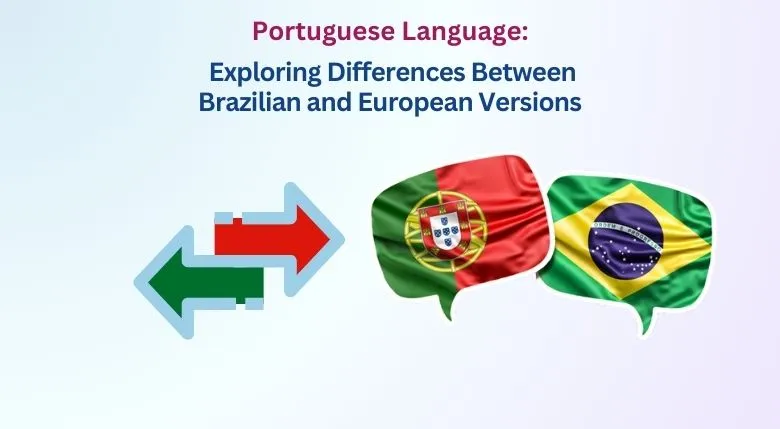 Have you ever dreamt of learning the Portuguese language? Learning a language can be fun. Maybe while learning Portuguese, you imagine yourself strolling down the charming streets of Lisbon or playing football on the sandy beaches of Rio de Janeiro.
Have you ever dreamt of learning the Portuguese language? Learning a language can be fun. Maybe while learning Portuguese, you imagine yourself strolling down the charming streets of Lisbon or playing football on the sandy beaches of Rio de Janeiro.
But wait—anyone with basic geographical knowledge would think that Lisbon and Rio de Janeiro are thousands of miles apart from each other. Then how could learning the same language connect two such distant places? Well, the answer lies in the vibrant variations of the Portuguese language across the Brazilian and European cultures.
Although sharing the language, the Portuguese spoken in Brazil is slightly different from the one spoken in Portugal. From vocabulary and grammar to pronunciation and expressions, these differences add a unique twist to each country’s way of speaking the language.
Curious to know more? Then let’s explore the linguistic difference between the Brazilian and European Portuguese.
The Origin of the Portuguese Language
The Portuguese that we know today evolved from the ancient Latin language. However, the credit for bringing the language from Europe across the Atlantic to Brazil goes to the 15th-century Portuguese explorers. Since then, after influence from the natives, African, and European cultures, Brazil’s Portuguese came to be.
Simultaneously, European Portuguese underwent some changes due to its frequent interactions with neighboring, North African, and Middle Eastern countries.
Despite shared linguistic origins, these two variations of the Portuguese language have significantly differed over the years. Some grammatical and vocabulary are so contrasting that only a professional Portuguese translation service can tell the difference.
Pronunciation Differences: Fluid vs. Rigid
The pronunciation difference between the variations is quite easily noticeable. On one hand, Brazilian Portuguese tends to have a fluid pronunciation, while on the other hand, European Portuguese sounds more rigid.
One interesting difference between both variations is the use of vowels.
- In Brazilian Portuguese, the vowels are pronounced in a clear, elongated way, which sounds soothing to the ears.
- In European Portuguese, the vowels are often shortened or even barely pronounced.
These pronunciation differences must be noted by someone aspiring to be a professional Portuguese interpreter. Knowing these differences will not just help to convey messages more accurately but also help to promote both variations of the language.
ARE YOU LOOKING TO CONVERT YOUR CONTENT INTO ACCURATE PORTUGUESE?
Then trust Somya Translators to fulfil your needs!
Grammatical Differences: Not Much Yet Identifiable
While on the rudimentary level, both languages follow the same grammatical rules. However, some subtle differences affect how formal or casual one sounds.
Brazilian Portuguese describes progressing actions using the gerund form, whereas the European version uses the infinitive form.
For example, the sentence “I am eating” will be “estou comendo” in Brazil and “estou a comer” in Portugal.
An additional recognizable difference lies in the use of pronouns. The word “you” is denoted differently in both the Portuguese languages.
- In Brazil, “você” is the common way to say “you.”
- In Portugal, “tu” is commonly used, but some natives even use “você” for formal conversations.
English-to-Brazilian Portuguese translation services must be careful while using pronouns and verb forms, especially in legal or medical conversions, where precision matters a lot.
Vocabulary: Major Differences
Perhaps the most significant difference between Brazilian and European Portuguese is vocabulary. Some essential everyday-use items are called by different names depending on the county.
- Juice:
- Brazilians call it “suco.”
- Portuguese call it “sumo.”
- Train:
- Brazilians refer to it as “trem.”
- Portuguese call it “comboio.”
- Bus:
- Brazilians call it “autocarro.”
- Portuguese refer to it as “ônibus.”
These differences may pose a challenge for even the best English-to-Portuguese translation services. A professional linguistic agency must be familiar with all these variations to provide accurate and natural-sounding translations.
Idioms and Expressions: A Cultural Contrast
Every language has its version of idioms and expressions that best suit its culture. The Brazilians and the Portuguese are no different.
Imagine you have made a mistake!
- A Brazilian would say “pisar na bola,” which means to step on the ball.
- A Portuguese person would say “fazer uma vaquinha,” which means to make a little cow.
These idioms are fun to explore but can be tricky to understand for new language learners. Additionally, machine translations may not use these idiomatic expressions accurately, resulting in incorrect conversions. Hence, it is advisable to find certified translation services for documents that need to be converted into Brazilian or European Portuguese.
Did you know that, like Brazilian and European Portuguese, the U.S. and Indian English have some subtle but essential differences? Check this blog to read more: Understanding the Differences in the English Language between India and the U.S.
Get Top-Tier Portuguese Translations
Whether you travel to Brazil or Portugal or want to expand your business in these flourishing economies, having translation partners is a must. Somya Translators, a globally leading Portuguese translation service, could be the perfect linguistic partner for you. Certified under ISO 17100:2015, we provide services of expert native linguists, who are familiar with every language difference between Brazilian and Portuguese.
Additionally, our efficient project workflow ensures all deadlines are met with no compromise on the quality.
Some exceptional linguistic services we provide for the Portuguese language are:
- Portuguese Certificate Translations
- Portuguese Patent Translations
- Portuguese Manual Translations
- Portuguese Audiovisual Translations
- Portuguese Website Translations
- And much more.
So, why wait? Speak the local language accurately and get results instantaneously. Reach out to us today and explore how our diverse services can help satisfy your needs!







